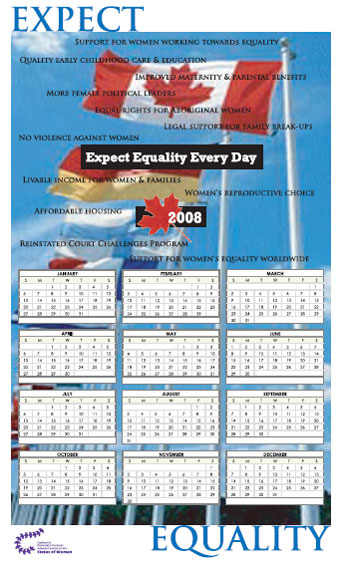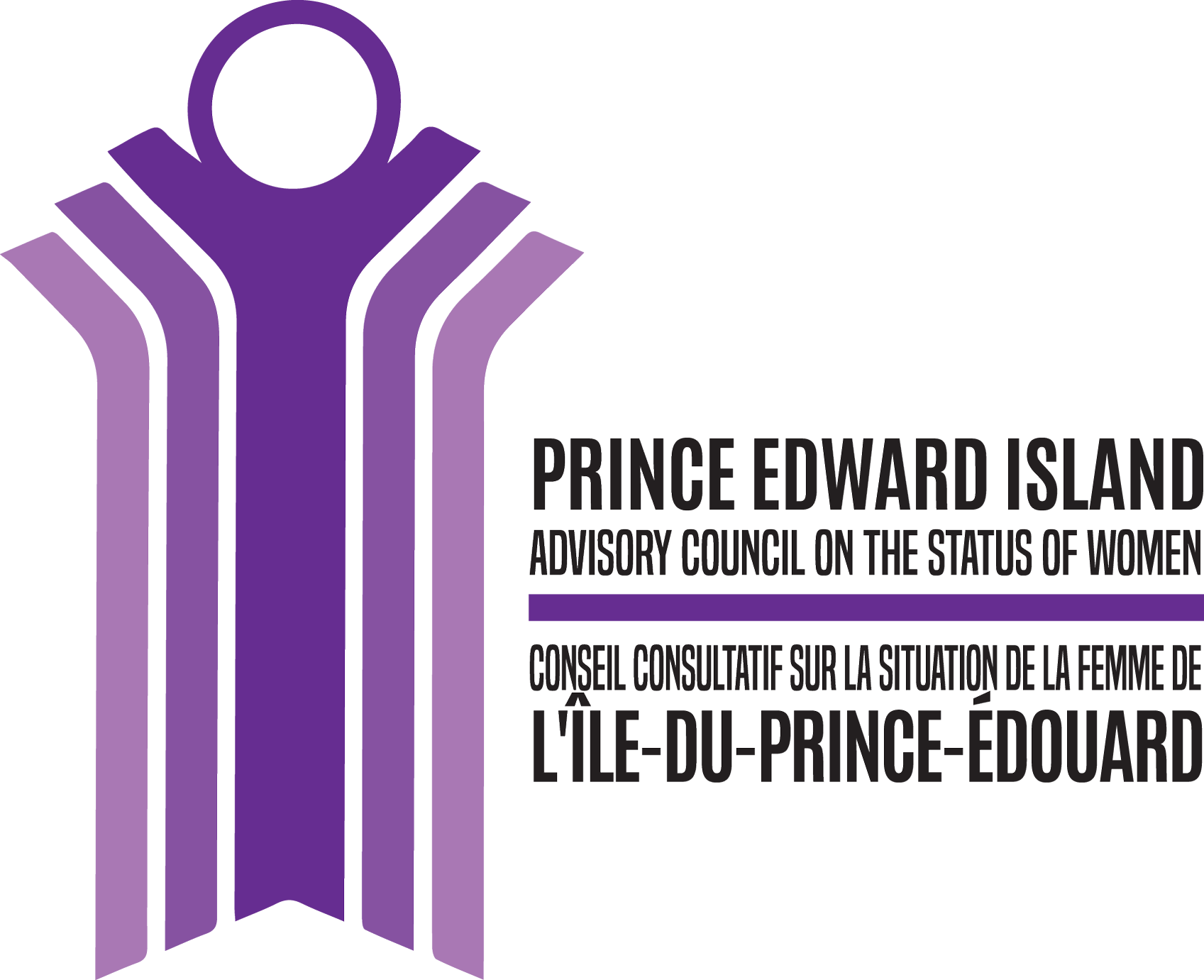 It was a politically important week this week in Canada, with a federal election on April 28. Because the PEI Advisory Council on the Status of Women has a provincial mandate, we haven’t often been active during federal elections, except pointing to other groups’ resources and campaigns.
It was a politically important week this week in Canada, with a federal election on April 28. Because the PEI Advisory Council on the Status of Women has a provincial mandate, we haven’t often been active during federal elections, except pointing to other groups’ resources and campaigns.
However, in 2008, we created a resource on federal issues on behalf of the National Coalition of Advisory Councils on the Status of Women, which was active at that time. At the beginning of 2008, Council ED designed a well-appointed poster-sized 2008 calendar with the key message to “Expect Equality Every Day.” The reverse of the calendar outlined the federal issues that Advisory Councils across Canada identified as priorities, stating “Issues that affect Canadian women are important all year long.” When Parliament dissolved and an election was called in October 2008, we used the statements of expectations from the “Expect Equality” calendar to assess and summarize the platforms of every major political party, with interesting observations and results. The conclusions are summed up in a news release below.
How much has changed since 2008? Certainly, a lot of the language. How about the issues? You be the judge!
CANADIAN WOMEN EXPECT EQUALITY EVERY DAY
Some actions women expect our federal government to take in 2008:
Fund quality early childhood care & education
• Support women to participate equally in the workforce and economy by supporting families with publicly funded childcare. • Invest in a nationwide system for early childhood care and education that is built on principles of quality, universal access, affordability, and focus on children’s development. • Recognize that the current Universal Child Care Benefit does not provide equitable access to childcare for families. • Face it: when 67% of Canadian women with children under six work outside the home, a national childcare system is non-negotiable.
Ensure livable income for women & families
• Enhance women’s economic equality and support citizens to attain livable income for their families. •Enact pay equity. • Recognize the diversity of work that contributes to society, including women’s non-paid work. • Understand that livable income means recognizing the right of small, rural, and remote communities to retain their young people and maintain families and social support networks. It requires far-seeing, appropriate economic development that looks beyond the next election and that benefits both women and men. It requires an appreciation for work, workers, and excellence in the workforce. • Acknowledge that income is the most important social determinant of health, so livable income must be recognized as a pillar of healthcare in Canada. • Play an important role in funding and setting national standards for social programs.
Commit to affordable housing
• Commit to meeting citizens’ housing needs by extending affordable housing programs and anti-homelessness programs beyond 2008. • Implement a comprehensive national housing strategy, coordinated across all provinces and territories, with goals to build universally accessible social housing units, increase housing subsidies, and meet Aboriginal people’s needs both on- and off-reserve. • Acknowledge women’s specific, gendered housing needs, especially in cases where violence and abuse have compromised the safety of women’s “homes.” • Address immediately the urgent issue of women’s homelessness north of 60. • Integrate housing policy with other social policy.
Eliminate violence against women
• Declare violence against women and girls unacceptable. • Recognize that women and girls experience violence due to inequality. • Invest in violence prevention. • Listen to women who have experienced violence and learn from them. • Support funding increases for the equality-seeking organizations that are experts and leaders in eliminating violence in our communities. • Include in decision-making workers, and especially front-line workers, in women’s centres, shelters, and transition houses.
Fund legal support for family break-ups
• Fund access to family law and other civil legal aid. The majority of clients for family law legal aid are women. Criminal law legal aid, accessed mostly by men, is cost-shared by federal and provincial governments. Meanwhile, women across the country have varied and unequal access to family law legal aid, depending on where they live. • Dedicate federal funding specifically for family law legal aid, to be transferred to provinces and territories. • Hold all provinces and territories to national standards. • Amend the Divorce Act to protect the best interests of children and the equality and safety of all women.
Improve maternity & parental benefits
• Improve the current Employment Insurance–based system for maternity and parental benefits by increasing access to benefits for parents who are self-employed or in non-standard work arrangements. • Improve the value and duration of benefits for families that welcome children into their families by birth or adoption. • Implement the Standing Committee on the Status of Women’s recommendations on parental benefits.
Act for women’s reproductive choice
• Ensure that women in all regions of Canada have access to medical care, as promised in the Canada Health Act. It is unacceptable that hospitals in some regions will not provide abortions when needed, and clinic-based abortions remain difficult or expensive to access in many places across the country. • Give women’s health and gender analysis high priority in government’s planning for the healthcare system.
Reinstate Court Challenges Program of Canada
• Reinstate the Court Challenges Program of Canada, which funded equality-seeking groups to bring cases to court to advance the language and equality rights guaranteed under Canada’s Constitution. Former court challenges included cases seeking equal marriage for same-sex couples, pay equity for women, maternity benefits, the right of women to say no to sexual assault, and many other rights-based issues necessary to women’s equal participation in our society.
Increase female political leaders
• Take immediate measures to support women to run for and serve in elected office. We expect more than 21% of MPs to be women. •Select women to be equally represented in the most influential Cabinet portfolios. • Work proactively among all political parties to get women’s names on ballots. • Examine democratic and legislative processes to eliminate barriers to women. • Undertake electoral and democratic reform.
Ensure equal rights for Aboriginal women
• Ensure Aboriginal women’s rights keep pace with the rights of non-Aboriginal women. • Ensure matrimonial property rights and take immediate action on Bill C-31, to allow Aboriginal women to pass Indian status to their children even if they “married out” in the past. • Sustain Aboriginal women’s rights by supporting women’s role in Aboriginal self-government.
Support women’s equality worldwide
• Take leadership among nations in promoting women’s equality and eradicating poverty. • Meet commitments under the UN Convention on the Elimination of All Forms of Discrimination Against Women. • Meet the UN Millennium Development Goals. • Commit at least 0.7% of Canada’s Gross National Income to international aid. • Play a part in improving the lives of women and girls worldwide.
Support women working towards equality
• Fund organizations that work for women’s equality. • Make equality a priority in the federal budget, with serious attention to recommendations women’s organizations bring forward through FAFIA’s gender budgeting project. • Make equality central to Status of Women Canada’s mandate again. • Increase Status of Women’s funding for equality-seeking work. • Make research and advocacy projects eligible for support again. • Commit to maintaining the Standing Committee on the Status of Women and taking up their recommendations.
NEWS RELEASE: Most Parties Are Paying Attention to Women, Praises the PEI Status of Women
Charlottetown, October 8, 2008 – “When we look closely at most of the federal parties’ platforms, we see that they are taking women’s equality issues seriously,” says Isabelle Christian, Chairperson of the PEI Status of Women Advisory Council. The PEI Status of Women Advisory Council has closely compared the platforms of the federal Conservative, Green, Liberal, and New Democratic parties. This election, all the parties except the Conservatives make specific reference to the importance of women’s equality in their platform documents.
The PEI Status of Women compared platforms based on a list of 12 women’s equality issues they set as priorities with their colleagues in the National Coalition of Provincial and Territorial Advisory Councils. The PEI Status of Women has published their detailed platform analysis [web link no longer active]. Here, people can download the documents and, if they disagree or find errors, they can have their say through a comments feature.
“It is in the federal parties’ interests to address women’s equality issues,” says Christian. “Women make up half of Canada’s voters, even though they make up just over a fifth of our Parliamentarians.”
She continues, “While issues of women’s equality are not front-and-centre in most news reporting this election, government policy on issues such as maternity and parental benefits, eliminating violence against women, restoring funding for women’s organizations, and livable income for women and their families make a big difference in ordinary women’s lives across PEI and across Canada.”
Says Christian, “Many of these concerns get good profile in most of the federal political parties’ promises and platforms for the current election.”
Christian and the Status of Women Council point to highlights from each party. The Conservatives promise to give self-employed parents access to maternity and parental benefits. The Greens propose Guaranteed Livable Income as a support for citizens as Canada addresses the challenges of climate change and moves to a green economy; they show particular sensitivity to Aboriginal concerns and same-sex and transgender issues. The Liberals promise to include hateful acts against women and girls in hate crime legislation, to restore court challenges for equality-seeking groups (with double the funding that existed before cuts), and to create an independent Commissioner for Gender Equality who would report to Parliament on how well government legislation and policy support equality goals. The Liberals and New Democrats offer closely matched plans for reducing poverty in Canada and for bringing in universal, quality early childhood care and education. The NDP offers the most comprehensive plan for affordable housing, for eliminating violence against women in Canada, and for women’s human rights and enhancing women’s equality worldwide (such as supporting creation of a United Nations Women’s Agency). All the parties cost out their platforms.
“Consensus is building on many issues,” points out Christian. “For instance, all parties except the Conservatives see affordable housing as essential to equality, are committed to universal childcare, and promise to ratify the UN Declaration on the Rights of Indigenous Peoples,” she notes. “And all the parties, including the Conservatives, are doing better at nominating women as candidates.” Island voters have a particularly strong selection of women candidates this election.
“We encourage all Island women to vote in the federal election,” concludes Christian. “And we further encourage them to vote in a way that they believe will advance women’s equality, especially for women who are struggling in the day-to-day.”


